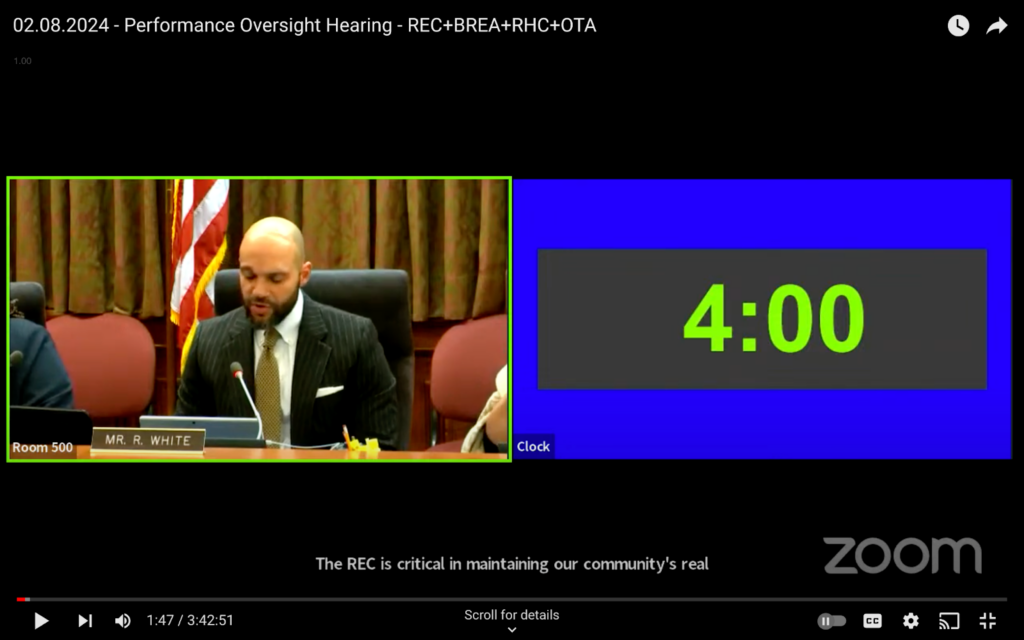As the coronavirus pandemic rages and the related economic fallout continues, the U.S. Census Bureau reports that 26.7% of adults in the District live in households not current on rent or mortgage payments, where eviction is at least somewhat likely. Yet with only one legislative meeting left in the 2019-20 DC Council period, time is running out to pass permanent legislation that would seal tenants’ eviction records that could otherwise stymie their ability to secure housing.
In April, the DC Council passed a bill that banned evictions and prohibited landlords from raising rent and charging late fees as long as the mayor’s public health emergency order remains in effect. Despite those protections, DCist reported that landlords filed 1,100 eviction complaints against tenants, the first step in initiating an eviction proceeding, from March 17 until early May, when the council prohibited the practice throughout the health crisis. While no cases will proceed as long as the eviction moratorium remains in place, the complaints themselves remain a part of the tenant’s rental history.
Landlords make little distinction between an eviction complaint and an actual eviction when screening potential tenants, according to advocates. If either shows up on a potential tenant’s record, their rental application will most likely be denied.
Separate from the ongoing moratorium, the council approved emergency and temporary legislation that includes eviction-sealing requirements like those in the permanent bill. The version now in effect is set to expire Feb. 7, and temporary legislation — which would last 225 days once it becomes law — is still awaiting congressional review.
Meanwhile, the permanent legislation — the Eviction Record Sealing Authority Amendment Act of 2019 — was the subject of an Oct. 30 hearing held jointly by the Committee on Housing and Neighborhood Revitalization and the Committee on Government Operations, giving advocates on both sides of the issue a chance to weigh in. If passed, the bill would make permanent a requirement that the D.C. Superior Court seal eviction records after as little as 30 days if the case did not result in eviction and after three years no matter the outcome. The bill would also require landlords to provide tenants with a 30-day notice for nonpayment of rent prior to filing an official complaint with the court, and would prohibit discrimination based upon a tenant having sealed records under their name.
The amendment could be especially helpful for tenants who have eviction complaints on their record. At the hearing, supporters emphasized the disproportionate number of eviction complaints compared to actual evictions. Two researchers from Georgetown University pointed out that, according to their research, 94.5% of eviction complaints filed with the court system never result in an eviction.
“Public eviction records thus create a sort of blacklist that leaves a lasting mark on tenants that have experience of the eviction process,” Georgetown University associate professor Eva Rosen said. “Since many low-income tenants experience income volatility that leads to missed rental payments, it’s not uncommon to have an eviction filing that does not result in an eviction.”
Though she supports sealing eviction records from the public, including landlords and their affiliates, Rosen added that the council should “preserve access to eviction records by researchers” so they can track eviction trends that could help to inform future policy decisions.
Private “data brokers,” such as tenant screening companies, can create particular problems for renters, according to Natasha Duarte, senior policy analyst at the advocacy group Upturn. She told the council that when eviction complaints are filed, brokers access the public records directly from the court website and save them in private databases. Landlords pay the companies to attempt to match applicant names to those records.
“At this step, accuracy is a huge problem,” Duarte testified. “Sometimes [the companies] completely omit the underlying records and simply report that a disqualifying record was found. … Because there are so many different tenant screening companies, renters cannot find out in advance or challenge what a company will say about them.”
Jesse Rabinowitz, the advocacy and campaign manager of Miriam’s Kitchen, said that DC’s current law “disproportionately affects Black people,” with landlords able to use eviction records as a screening tool to “cherry-pick” potential tenants. He also referred to the discrimination faced by voucher holders, whose rent is paid for by the government.
“Beyond being racist and discriminatory, not renting to a voucher holder whose rent is largely paid for and guaranteed by the government because they have faced eviction in the past simply makes no sense,” Rabinowitz said.
Though he supports the bill, Rabinowitz suggested that the council also pass the Fair Tenant Screening Act (which would spell out certain rights, restrictions and responsibilities of landlords and prospective tenants during the screening process) and the Michael Stoops Anti-Discrimination Act (which would protect individuals experiencing homelessness from discrimination) in tandem with the bill in question. The council also needs to invest in more housing vouchers to prevent a severe housing crisis once the pandemic subsides and DC’s public health emergency is lifted, he added.
Others at the hearing weren’t sold on the bill. Leslie Perry, a multifamily property owner and a former landlord/tenant attorney, said landlords already incur significant costs for legal proceedings.
“During my tenure in landlord/tenant court, I have found many small owners who are left without a competent attorney because they could not afford representation,” Perry said. “These regulations are not fair because they add extra layers of protection to tenants who are adequately protected.”
Perry added that the “scales of justice in the landlord/tenant [relationship] has bent so far in the tenant’s direction that the small multifamily owners are being forced out of business.” Eviction complaints should not be sealed, he said, because landlords would not be able to determine whether a potential tenant might “abuse the regulation by not paying rent for months or years.”
Dean Hunter — the founder and CEO of the Small Multifamily Owners’ Association, a trade group that represents small apartment building owners and rental housing providers in DC — echoed Perry’s sentiments. He called the bill “overreaching and broad.” Passing legislation to make the eviction process more difficult, when a temporary moratorium on evictions is already in place, would impose additional burdens on small housing providers who are suffering as a result of the pandemic, Hunter said.
Randi Marshall of the Apartment and Office Building Association of Metropolitan Washington told the council that the draft legislation fails to make a necessary distinction between eviction records for cases of non-payment of rent and those citing criminal activity. “By limiting access to eviction records, you’re mandating that housing providers enter into a business transaction blindly without offering any backstops or protections from bad tenants for those housing providers operating in good faith and compliance with the law,” Marshall testified.
While interest in tenant protections has grown as the pandemic continues and many residents have struggled to keep paying their rent, this legislation was introduced before the health crisis. Ward 3 Councilmember Mary Cheh and at-large member Anita Bonds, the housing committee chair, introduced a version of it during the 2017-18 council session, although no public hearing took place. Cheh re-introduced it with six fellow councilmembers in June 2019, but to move forward the legislation will have to be reintroduced come January, given that there’s no longer time for votes at two legislative meetings this year.
This article was co-published with The DC Line.








